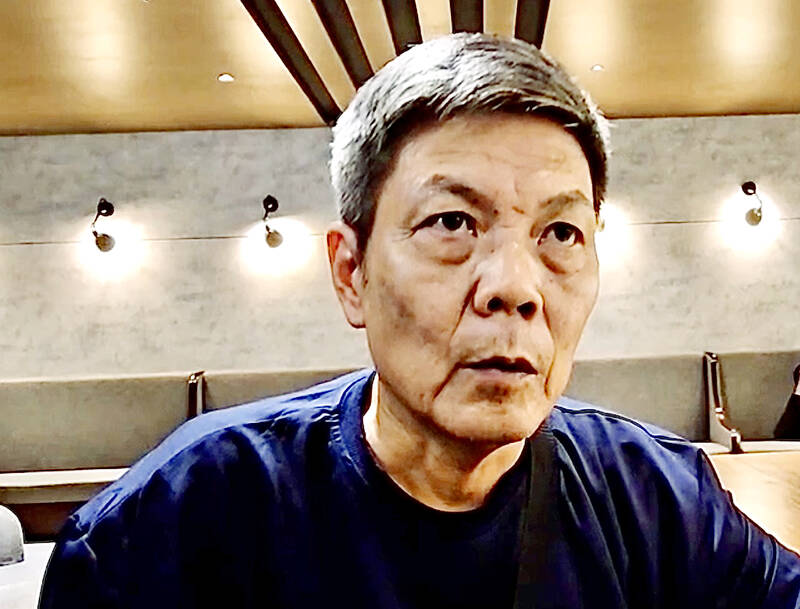Chinese dissident Chen Siming (陳思明) yesterday urged the government not to deport him back to China after he refused to board a plane at Taiwan Taoyuan International Airport during a stopover on a flight bound for China.
Chen, who has been arrested multiple times in China for publicly commemorating the Tiananmen Square Massacre, said he hoped that the US or Canada would grant him political asylum.
He has been on the run since escaping China two months ago, Radio Free Asia quoted him as saying in a report.

Photo courtesy of a reader
The Mainland Affairs Council said it is working to resolve the matter with government agencies, but did not elaborate.
The dissident had been in Cambodia and Thailand before reports that Lu Siwei (盧思位), a Chinese human rights lawyer, had been extradited from Thailand, prompting him to flee, Radio Free Asia reported.
“Chinese public security’s efforts to harmonize is becoming increasingly cruel and insane,” Chen wrote on X yesterday in a post that has since been deleted.
“They have freely summoned and detained me without any care to the proper legal procedures, confiscated my cellphone and tried to have me tested for mental conditions,” he said, adding that he was forced to leave his country due to intolerable conditions.
In a video attached to the post, Chen asked the US and Canada to grant him political asylum, and urged Taipei to not deport him.
A resident of Hunan Province, Chen marked the anniversary of the massacre by holding a sign in 2017, 2018, 2020 and 2021. He was arrested each time.
Chinese authorities have detained Chen ahead of the massacre’s anniversary in the past few years, he said.
“I did not escape to benefit from the economic conditions in the US, but to avoid the absence of human rights, dignity and rule of law in China, which has shown no cause for hope,” he said.
Chen said that he does not want to bring “trouble” to Taiwan.
Hopefully, Taipei could sympathize with his bid for temporary sanctuary in Taiwan, as he does not have a US visa and Beijing revoked his passport.
Chinese human rights advocate Wang Jianhong (王劍虹) in May said that Chen had written online that he was about to be detained by Chinese public security agents and had refused to delete the post, resulting in threats of a prison sentence.
New School for Democracy chairman Tseng Chien-yuan (曾建元) yesterday urged Taipei to help Chen as it has done in similar cases.
The government has helped people fleeing from persecution in China to obtain asylum in a third country, Tseng said, citing the cases of dissidents Yan Kefen (顏克芬) and Liu Xinglian (劉興聯) in 2019.
Chen should have the same rights as someone with refugee status certified by the UN, Tseng said.

The Central Election Commission has amended election and recall regulations to require elected office candidates to provide proof that they have no Chinese citizenship, a Cabinet report said. The commission on Oct. 29 last year revised the Measures for the Permission of Family-based Residence, Long-term Residence and Settlement of People from the Mainland Area in the Taiwan Area (大陸地區人民在台灣地區依親居留長期居留或定居許可辦法), the Executive Yuan said in a report it submitted to the legislature for review. The revision requires Chinese citizens applying for permanent residency to submit notarial documents showing that they have lost their Chinese household record and have renounced — or have never

A magnitude 5.6 earthquake struck off the coast of Yilan County at 12:37pm today, with clear shaking felt across much of northern Taiwan. There were no immediate reports of damage. The epicenter of the quake was 16.9km east-southeast of Yilan County Hall offshore at a depth of 66.8km, Central Weather Administration (CWA) data showed. The maximum intensity registered at a 4 in Yilan County’s Nanao Township (南澳) on Taiwan’s seven-tier scale. Other parts of Yilan, as well as certain areas of Hualien County, Taipei, New Taipei City, Taoyuan, Hsinchu County, Taichung and Miaoli County, recorded intensities of 3. Residents of Yilan County and Taipei received

Taiwan has secured another breakthrough in fruit exports, with jujubes, dragon fruit and lychees approved for shipment to the EU, the Ministry of Agriculture said yesterday. The Animal and Plant Health Inspection Agency on Thursday received formal notification of the approval from the EU, the ministry said, adding that the decision was expected to expand Taiwanese fruit producers’ access to high-end European markets. Taiwan exported 126 tonnes of lychees last year, valued at US$1.48 million, with Japan accounting for 102 tonnes. Other export destinations included New Zealand, Hong Kong, the US and Australia, ministry data showed. Jujube exports totaled 103 tonnes, valued at

BIG SPENDERS: Foreign investors bought the most Taiwan equities since 2005, signaling confidence that an AI boom would continue to benefit chipmakers Taiwan Semiconductor Manufacturing Co’s (TSMC, 台積電) market capitalization swelled to US$2 trillion for the first time following a 4.25 percent rally in its American depositary receipts (ADR) overnight, putting the world’s biggest contract chipmaker sixth on the list of the world’s biggest companies by market capitalization, just behind Amazon.com Inc. The site CompaniesMarketcap.com ranked TSMC ahead of Saudi Aramco and Meta Platforms Inc. The Taiwanese company’s ADRs on Tuesday surged to US$385.75 on the New York Stock Exchange, as strong demand for artificial intelligence (AI) applications led to chip supply constraints and boost revenue growth to record-breaking levels. Each TSMC ADR represents